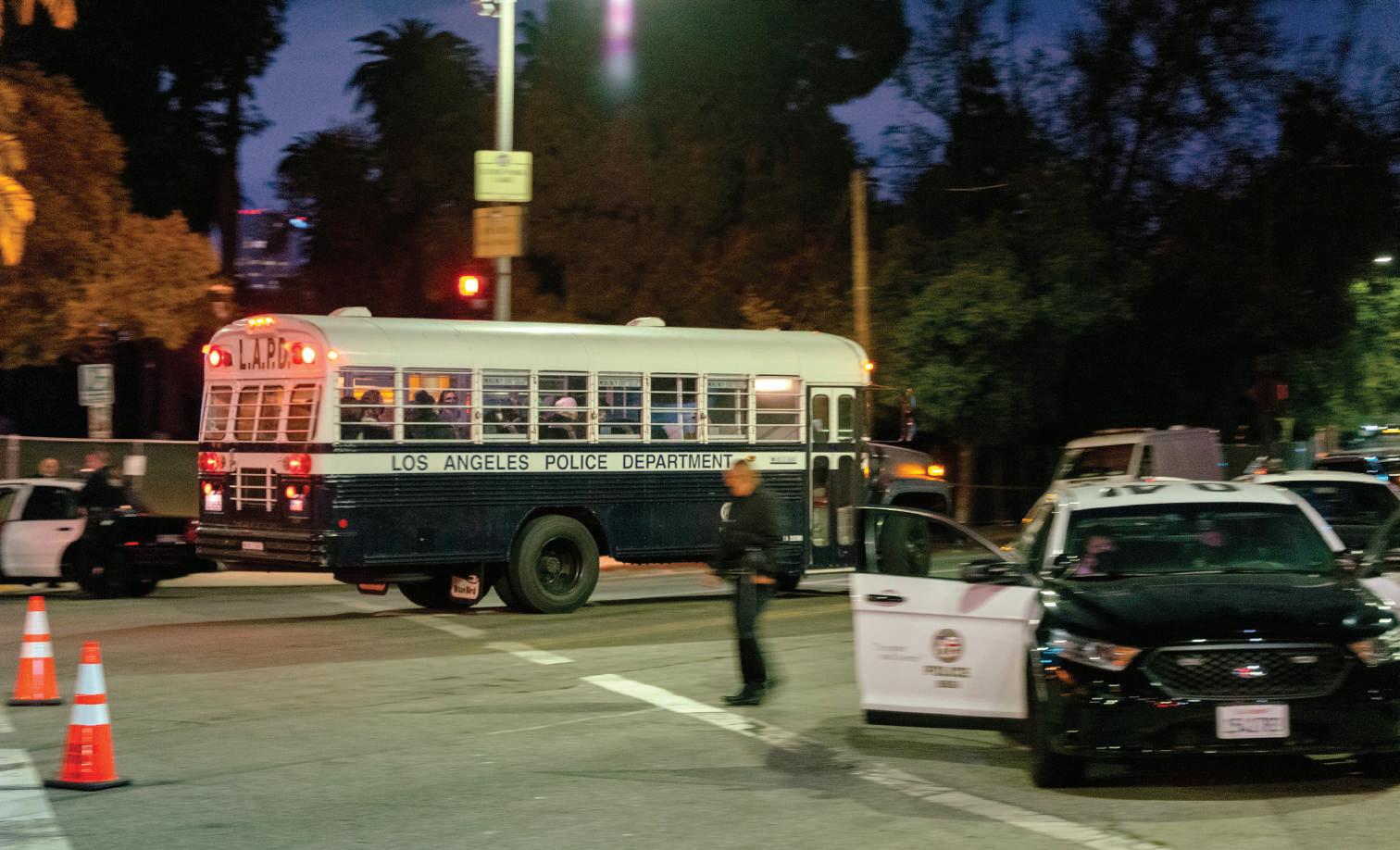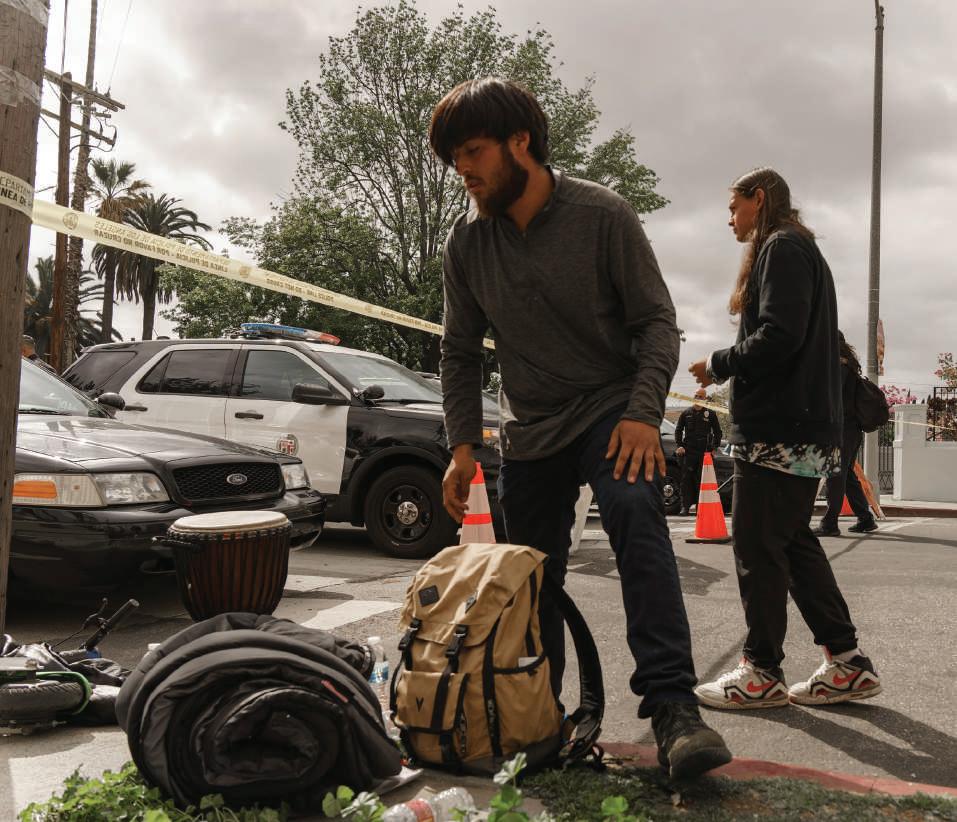
7 minute read
POLICE SNARE COLLEGIAN REPORTER IN HOMELESS CRACKDOWN
2021 SPRING-SUMMER
TAKING MILITARIZED POLICE ACTION TO DISPLACE PEOPLE WHO ARE ALREADY DISPLACED IS CRUEL AND DOES NOTHING TO BOLSTER PUBLIC SAFETY. MASS ARRESTS OF PROTESTERS, LEGAL OBSERVERS, AND JOURNALISTS WILL NOT KEEP THE CITY’S BRUTAL, ILL-CONCEIVED ACTIONS FROM BEING KNOWN.
Advertisement
— HECTOR VILLAGRA EXECUTIVE DIRECTOR, ACLU OF SOUTHERN CALIF.
POLICE SNARE COLLEGIAN REPORTER IN HOMELESS CRACKDOWN
It was no surprise when police officers in riot gear began to evict residents of a homeless encampment in Echo Park at the end of March. The surprise came when LAPD officers rounded up and arrested journalists.
BY MATTHEW RODRIGUEZ
PHOTOS BY LOUIS WHITE
Rumors swirled among the protesters at Echo Park Lake as nearly 100 LAPD officers surrounded them for hours. Police were ready for a confrontation if anyone interrupted their forced removal of the unhoused park residents.
Members of the media were there and so were observers and community activists.
When police ordered protesters and homeless to disperse, some packed their belongings and cleared the area. Others were ready to stand their ground.
“They’re taking cameras,” one person said.
“They’re arresting people,” said another.
Police were indeed arresting people and not just protesters. In the darkness, they encircled members of the press, including reporters from major media outlets like the L.A. Times, Spectrum Cable, and
KnockLA, a nonprofit newsroom tied to progressive causes. They also detained legal observers and reporters from smaller media outlets, some of whom lacked press credentials.
L.A. City College reporter Keliyah Williams was trapped in the middle of the large group of protesters as police herded them down Glendale
Boulevard toward the lake to more waiting officers.
Williams reports for the Collegian, the student voice of L.A. City College since 1929. She had been to Echo Park to cover the unhoused before. She followed the tension between the LAPD and the activist groups the police were threatening to evict from the park.
Williams says she felt a glimmer of hope when LAPD officers asked for members of the press to step forward. Her hopes faded when they asked for a press badge, something she did not have.
“I went up and told the officer that I was with the Collegian, that school was not in-person this semester, but that I have my school schedule and some bylines to prove that I’m a journalist,” she said. “They would not even look at it.”
Unmoved, the officer instructed Williams to get in line with the protesters waiting to be arrested. She would be next.
“Once they heard LACC and no press badge, they were not interested,” Williams said. “They were targeting people once they were identified. If you didn’t pass the ‘vibe check,’ you were next.”
Police officers deployed a crowd-control technique referred to as “kettling.” It is also known as “trap and detain,” when officers surround protesters to corral them before arrests.
“Once I was put into plexi-cuffs, they patted me down, took my bag from me and asked for my ID, which I thankfully had and made my processing a little faster,” Williams said. “While this was happening, the officer was trying to make conversation. He says, ‘You go to LACC?’ and I think ‘oh, so it’s not that you doubt that I’m a student journalist.’”
Williams says she did not feel afraid or intimidated by the presence of the more than 100 LAPD officers.
“He told me how this was ‘the risk that you take when you come to these things,’ and how I was ‘so lucky to be here’ because he was an immigrant from the Ukraine, and compared America to a rich kid with a Mercedes but wanting a Range Rover,” she said. “Basically, saying we as protesters were ungrateful and that we should be happy, not protesting. It was just such an interesting view.”
Not so interesting for residents of Echo Park who decided to stand in solidarity with the homeless. Olivia Martinez says she is familiar with protests but Echo Park was different.
“I had never seen organizers call a protest an unsafe situation, but there was nothing we could do at that point besides keep ourselves safe and go home,” Martinez said. “I’ve been to many protests this year, and this one really felt like a show of force from the LAPD. There were cops with full riot gear on. I got shoved, and after we were fired at with rubber bullets, I decided to go home.”
The LAPD tactics drew strong criticism from a few local officials and groups like the ACLU, which called the arrests “militarized police action” in a statement.
“Mass arrests of protesters, legal observers, and journalists will not keep the city’s brutal, ill-conceived actions from being known. The city leaders who approved this approach should be held accountable,” wrote Hector Villagra, the executive director of the ACLU of Southern California.
The L.A. Press Club (LAPC) reacted the next day to events in Echo Park.
Adam Rose, a journalist on the LAPC board of directors and chair of the Press Rights Committee expressed concern about interactions in the field between police and the press.
“Our position is very clear,” Rose told the Collegian Times. “Under the First Amendment to the Constitution of the United States, as well as various local and state statutes and the state Constitution of California, the press should be able to record and document the activity of the police even during an unlawful assembly when the general public is required to disperse.”
Police seemed oblivious to any First Amendment guarantees, as officers moved Williams, other journalists, legal observers and protesters to a Metro bus. The LAPD released reporters from larger news outlets, but they transferred those who did not have press credentials to the LAPD South Central Station for booking.
Police charged Williams with failure to disperse at an unlawful assembly, which is a misdemeanor.
Journalist Albert Serna attends San Francisco State University and writes for the Boyle Heights Beat. He says access issues abound for student reporters.
“I think that as student journalists, we often get the brunt of cases where our rights are being violated. … Government officials, police, whoever it is, because we put the word ‘student’ in front of ‘journalist’ they think that our rights aren’t as important as professional journalists,” he said.
In a similar encounter, Collegian reporter James Duffy covered a town hall meeting sponsored by L.A. City Councilman Mitch O’Farrell. An LAPD officer turned Duffy away at the door because he did not have a press credential.
Student Press Law Center Senior Legal Counsel Mike Hiestand offers advice to any student journalists who are barred from public meetings.
“If they expect to be covering a body that may not want or expect attention from the press, it’s important to have a basic understanding of the open meetings law in play,” he said. “Thoughtfully explain your positions and if you are still barred from the meeting, ask that notice of your involuntary removal be included in the minutes and leave.”
Journalists should understand why a public body meets in a closed session. Hiestand says students should research the issue when they are denied access. If the law was broken, the student should seek help.
The LAPC is leading an effort of 15 or more California unions, journalism groups and press rights advocates. The goal is to form a coalition calling for better protections for journalists to cover protests and other forms of civil unrest. Meanwhile, Rose advises students to plan ahead.
“The philosophical is easy, the student journalists should be there, but the practical steps are where the problems occur,” he said. “Make sure you are backed up, make sure someone knows you are there and have your own personal contacts of organizations that can help you should you get into any legal trouble. You avoid problems by preparing in advance.”
Serna urges student journalists to fight for their rights guaranteed under the First Amendment. He recognizes they may face resistance, when they deliver unpopular messages.
“Since journalists have been doing their job, they have been in some shape or form attempts to silence them, he said. “Systemically, people in power only want us to do our jobs when it suits them.”
Williams is undeterred. In June, she learned that charges against her had been dropped, thanks to the efforts of the National Lawyers Guild. She retains her enthusiasm for news reporting.
“If anything, I’m thinking ‘when is the next one?” Williams said. “It’s put a fire under me. I’ve learned so much about the law and the community.”∫

AS STUDENT JOURNALISTS, WE DON’T HAVE THE BIG LEGACY NEWSPAPER NAMES BEHIND US AND THE LEGAL TOOLS, SO WE’RE AN EASY TARGET.
—ALBERT SERNA SAN FRANCISCO STATE UNIVERSITY
THERE WERE 182 ARRESTS FOR 409 PC, FAILURE TO DISPERSE, LAST NIGHT. DURING THE COURSE OF THE ARRESTS, THREE INDIVIDUALS IDENTIFIED THEMSELVES AS MEMBERS OF THE MEDIA. ADDITIONAL INDIVIDUALS IDENTIFIED THEMSELVES AS MEMBERS OF THE NATIONAL LAWYERS GUILD. ALL WERE RELEASED AT SCENE WITHOUT FURTHER ACTION.
—LAPD STATEMENT MARCH 26, 2021
2021 SPRING-SUMMER
Beatrice Alcala and Keliyah Williams contributed to this story.










